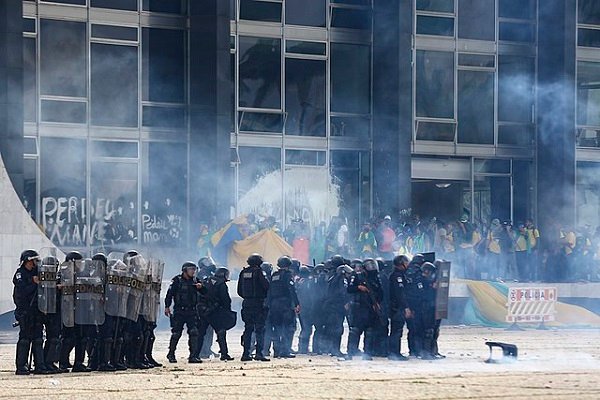This Content Is Only For Subscribers
To unlock this content, subscribe to INTERLIRA Reports.
The government is already implementing measures to reduce the chances of new incidents like that of 8 January. Justice and public Security Minister Flávio Dino presented to President Luiz Inácio Lula da Silva with a package of measures to curb further attacks against institutions. In addition, important members of the Congress, such as Senate President Rodrigo Pacheco, are pushing for actions to be taken to punish those that took part in the attacks, including members of the security forces, which can be delicate task due to the risk of insubordination.
Three of the proposals involve creating a police force to protect federal agencies; the drafting of a bill to punish sponsors of coup demonstrations; and the launch of tools to “moderate” content considered extremist on social networks. Some of the proposals need to be submitted to Congress.
Dino’s plan is to take advantage of the still latent commotion of parliamentarians with the scenes of destruction in the Chamber and Senate to approve them quickly.
National Guard
One of the main proposals is that the perimeter of the headquarters of the Three Powers of the Republic, the Alvorada and Jaburu Palaces, in addition to embassies, could not be under the responsibility of the Military Police, linked to a district government, which can oppose the federal government. This zone would be protected by a new force called the National Guard, subordinated to the Ministry of Justice, would carry out ostensive policing specialized in containing demonstrations and invasions.
New Criminal Types
There is also a project for the creation of new criminal types to frame coup plotters. It provides, for example, sanctions not only to individuals. Establishes that companies accused of sponsoring anti-democratic attacks are prevented from participating in bids and receiving tax benefits.
Fighting Extremism Online
Members of the federal government concluded that social networks were the main tool for convening the violent attacks. The incident in the Three Powers Plaza was planned and called online, where it was baptized by the coup plotters as “Festa da Selma”.
In this scenario, the ministry plans to propose laws that create mechanisms to force platforms to be more rigorous in monitoring and combating posts that clearly violate the Democratic State of Law.
No Amnesty
On Thursday (26), Senate President Rodrigo Pacheco (PSD) said in an interview to a news channel that there can be no pardon or amnesty for the criminals who invaded and destroyed the National Congress, the Federal Supreme Court and the Planalto Palace. Pacheco also informed that names of identified invaders are being forwarded to the Attorney General’s Office (PGR) – who is responsible for formally denouncing these suspects to Justice.
Furthermore, on Thursday afternoon, in a meeting in Brasília, the new Army Commander, General Tomás Miguel Ribeiro Paiva, reinforced to President Lula his commitment to investigate and punish culprits who are members of the Armed Forces involved in the terrorist attacks of 8 January.
Challenges
The sheer size of the investigations into the attacks on the buildings of the three Powers poses challenges to the investigative bodies and a series of obstacles to the judgment and effective punishment of the perpetrators of the crimes. The accountability of those involved comes up against the very number of suspects that may be the target of lawsuits (including coup protesters, financiers and authorities), in addition to the volume of material to be analyzed and the structure of the Judiciary to handle the demand and avoid prescriptions.




